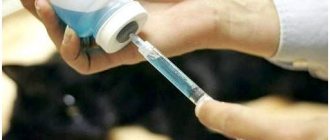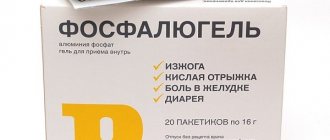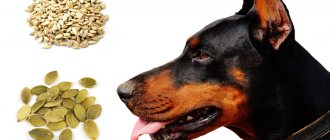Every dog is at risk of contracting helminthiasis even before its birth from a mother who has not been treated and prevented. Many pet owners are confident that dogs living in a house or apartment cannot become infected with parasites. In fact, this is not so; more than 70% of pets are found to have worms.
It is necessary and important for owners of shaggy pets to know what deworming is, how to properly care for a dog, what deworming medications for dogs to use if helminths are detected, and how to cure a pet from this dangerous disease. All this will be discussed in this article.
Danger
The behavior of the animal must be constantly monitored, since even a domestic dog can become infected by simply drinking water from a puddle or grabbing a ball from the ground with its teeth.
A sick dog's immunity is sharply reduced, as a result of which it will be vulnerable to many other diseases. The effectiveness of vaccinations decreases sharply, which explains the need for deworming before vaccination. Moreover, worms, living in the internal organs, cause mechanical damage to them and literally feed on the dog. If the disease is not cured in time, great harm to the animal’s health and even death is possible.
Signs
An attentive owner can, without visiting a veterinary clinic, understand that his beloved pet has worms; all he needs to do is watch him.
There are several main signs of infection:
- changes in habits and behavior: lethargy, apathy, tendency to dermatosis and eczema;
- changes in the gastrointestinal tract: decreased appetite or good appetite due to weight loss, changes in taste preferences, vomiting, diarrhea, constipation;
- the presence of blood, mucus, larvae or worms themselves in the stool;
- swollen and hard belly, protruding ribs;
- developmental and growth retardation;
- difficulty swallowing;
- itching of the anus (the dog “rides” on the back of the body in an attempt to get rid of it).
Signs
Many owners do not know how to determine the presence of parasites in an animal, making it difficult to treat worms in dogs. There are a number of signs that indicate the presence of worms in a pet:
- Puppies are inactive and lethargic. Their growth slows down. The cub's fur becomes matte, and the white of the eye acquires a bluish rim. The abdomen is swollen, the stomach is rumbling.
- The pet loses weight (even with a normal appetite); vomiting, diarrhea, and hiccups may occur after eating. If there are already a lot of worms, then the pet refuses to eat, and the immune system weakens.
- The mucous membranes become pale, and skin diseases and dermatitis may appear.
- Worms are noticeable in the animal's feces, blood and mucus appear. Parasites often cause constipation.
- The liver enlarges.
- Wandering larvae can injure lung tissue, which can lead to pneumonia.
- Recipes for cooking barley porridge in a slow cooker
- Chicken in a frying pan in sour cream sauce: recipes with photos
- Laser blood purification
Types of worms
Traditionally, it is customary to distinguish three main types of worms:
- Round (nematodes) : spindle-shaped, tapering at the ends. In nature there is a huge variety of species of these helminths (about 1,000,000); some species can reach 8 meters in length. These include: roundworms, pinworms.
- Ribbon, flat (cestodes) : they have a ribbon-like, long body at one end of which there is a head. When it enters the animal’s intestines, the head turns out, sticks to the intestinal walls, and the helminth begins to grow, reaching a length of 10 meters. The most famous representatives: pork tapeworm, bovine tapeworm, broad tapeworm.
- Flukes (trematodes) : these worms are distinguished by the presence of suckers not only in the front of the body, but also in the middle. Due to the peculiarities of their structure, they can live in many internal organs, and their offspring are innumerable, since new embryos are already developing in each larva. These worms include: liver fluke and cat fluke.
In addition to the above division of helminths, it is possible to carry out a classification depending on the organ in which they parasitize, these could be esophageal worms, heart worms, and so on.
How to remove worms from a puppy?
Treatment of helminthiases in animals is carried out with special drugs. And it is advisable to carry out this procedure throughout the dog’s life, starting from an early age. If you adopted a baby from an animal living on the street, then most likely he will be heavily wormed. Therefore, veterinarians recommend adding a spoonful of Vaseline oil to the medicine. This will help quickly remove not only parasites, but also toxins from the animal’s body.
You can rid your baby of worms using the following medications:
- Dirofen
- Drontal Junior
- Prazicide
- Prazitel.
But remember that they all contain substances that are toxic to the body of parasites, so you need to strictly adhere to the dosage.
Among the listed drugs, they are present as universal ones. They are intended for puppies and get rid of various worms. But there are also highly specialized ones that are capable of driving away certain types of parasites.
At the same time, the former are usually prescribed for regular prophylaxis. The latter are prescribed based on the results of laboratory tests prescribed in case of severe infestation of the animal.
As for children, to remove worms from them it is allowed to use only age-appropriate medications. But highly specialized ones cannot be prescribed to them.
Another thing you should pay attention to is that it is impossible to understand just by the absence of parasites in the feces of an animal whether it is sick or not. To do this, you will need to take tests and wait for their results.
Video: How to properly remove parasites from a puppy
What to do if the dog is already infected
As mentioned above, puppies can get worms from their mother even before birth, and deworming puppies has its own characteristics. In this regard, there is a need to deworm a newly acquired puppy, at least for prevention, even if no symptoms of infection are observed.
In this case, you must follow several rules:
- If you plan to deworm your dogs before vaccination, be sure to inform your veterinarian about possible helminths, he will select a remedy for this case.
- It is best to carry out deworming between February and March; at this time, deworming of dogs is most effective.
- Only an otherwise healthy pet can be treated for fleas; even fleas should be treated before the procedure, otherwise the drug should be prescribed by a doctor.
- Depending on the breed, some individuals may not tolerate deworming medications well; check this with your veterinarian.
- Be sure to check whether the bitch received prophylaxis before pregnancy; the time of the first dose of medication will depend on this.
Indications and contraindications
There is an opinion that deworming should be done every three months.
However, such a measure is needed only in cases where the dog is constantly at risk, that is, it is often in places where there are many other animals, walks through landfills, and eats raw meat. In other cases, the event should be held at intervals of six months.
- An animal cannot be subjected to the procedure if any pathology is present or the body is weakened or exhausted . Worming is prohibited during pregnancy and the lactation period, as it can harm the offspring.
- A mandatory procedure before vaccination . At the same time, it is important to make sure that the event was successful, since using the vaccine on an organism weakened by worms can provoke adverse reactions. In such cases, vomiting, diarrhea, and hyperthermia are noted. Among other things, the vaccine simply will not work and immunity to the vaccine will not develop.
Deworming is contraindicated for pregnant dogs.
Rules for deworming at home
- If you start deworming puppies from the age of three weeks, then you need to take a special drug that is used for puppies, since medications intended for adults may be too toxic for babies. Today drontal and canikquantel .
- The dosage is calculated based on body weight . Three days in advance, it is recommended to prescribe medications to the dog to help maintain liver function. On the day of the procedure, you should feed your pet the adsorbent and then give it for five days.
- Before carrying out manipulations to eliminate helminths, it is recommended to visit a doctor for examination and recommendations . It is advisable for a small puppy to administer Vaseline oil internally to protect the intestines half an hour after taking the product.
- You should carefully examine your dog's feces . If adult helminths are found, you should consult and be examined at a clinic to determine the type of parasites. If it is not possible to take the medicine on an empty stomach, you can take it two hours after eating. Recommended products for maintaining liver and kidney function: Karsil, Enterosgel.
- If, before vaccination, adult helminths are found in the animal, then they should be destroyed twice . The interval between deworming should be at least two weeks. Vaccinate seven or ten days after the second race.
- Even if there are no visible symptoms of helminthic infestation, prevention must be carried out at least twice a year , and, if there are increased risks of infection, then every three months. You can’t buy the first thing you come across at the pharmacy. A mandatory condition for the prevention and treatment of invasion is consultation with a veterinarian.
The age of the dog should be taken into account when using the drug Kanikquantel.
Choosing an anthelmintic drug
All anthelmintic drugs for dogs are divided into two large groups: universal (great for prevention) and special (prescribed for more effective treatment of a specific type of parasite, which is determined by the veterinarian based on test results). Particular care should be taken when choosing anti-worm medications for puppies, since incorrect selection of the drug and excessive dosage can be fatal.
If you decide to treat your pet yourself, be sure to read the contraindications and dosage of the drug. If precautions are not taken when using deworming tablets for dogs, the pet can be seriously harmed, and if the dose of the medicine is insufficient, the long-awaited positive effect will not occur.
Dogs should be dewormed about 4 times a year, and this activity may be related to the dog’s lifestyle. For example, prophylaxis should be carried out on a bitch 2 times a year after estrus, as well as before and at the end of the summer season.
And remember, it is possible to determine helminth infection by symptoms only when the animal is already heavily infected. Characteristic signs of helminthiasis indicate that internal organs are already affected. In this case, it is best to immediately consult a doctor; you should not select deworming tablets for dogs on your own.
Drug poisoning. Diarrhea after anthelmintic (Dog has diarrhea)
Signs of drug overdose and poisoning include:
- profuse drooling,
- tremor, unsteady gait,
- nausea, vomiting, diarrhea,
- loss of consciousness, convulsions,
- lethargy, apathy, refusal to eat.
Let's talk more about diarrhea.
When used, anthelmintic drugs have an irritating effect on the intestinal walls, resulting in the production of protective mucus, which in turn can lead to the development of diarrhea.
There should be no more than three episodes of diarrhea. If there are more episodes, you need to think about overdose and drug poisoning.
What to do in case of an overdose of deworming drugs? What can you do at home?
At home, we begin to give adsorbents such as Enterosgel, Smecta, and activated carbon. There are no such preparations at home - we take petroleum jelly or egg white. Then we pack up and go to the nearest veterinary clinic.
Adsorbents are also used to treat diarrhea caused by irritation of the intestinal walls.
Watch the video: Worms in a dog - The view of an ordinary person
How to carry out the deworming procedure
Deworming is an important part of caring for a pet’s health and must be carried out with full responsibility, because the pet’s condition depends on the owners. Of particular note: these activities are carried out differently in puppies and adult dogs.
Treatment regimen for puppies
The very first time puppies are given medications 2 and 4 weeks after birth, then they are vaccinated on the 42nd day. This scheme for deworming puppies is explained very simply: due to the fact that most often puppies are infected already in the womb, by the time of the first dose, adults have already developed in their body, it is precisely for their destruction that the administration of deworming drugs is aimed.
During the second dose, helminths also grew from the larvae deposited in the puppy’s body; they will die this time, but their larvae will remain. As you might guess, this process is almost impossible to stop, but you can at least partially alleviate the puppy’s illness.
Puppies under 6 months of age are given canine deworming medications approximately once a month, then quarterly. Your veterinarian will help you determine the time of your appointment more accurately. In addition, professionals advise giving dewormers for dogs together with sorbents, as this will reduce the load on the liver from toxins released by dying worms. Most often, Enterosgel is used for this purpose at the rate of 1 tsp. by 10 kg. dog's weight - an hour before feeding for 3 days.
Treatment regimen for adult dogs
When treating adult dogs, first of all, you should pay attention to the animal’s lifestyle. Dogs that are often outdoors or in public places are at high risk of becoming infected. They need to take anthelmintic drugs for dogs every 1-2 months; pet dogs are wormed once a quarter. In any case, this event should be held at least twice a year.
A dog that has given birth to puppies should not be treated while the puppies are drinking its milk.
It is worth using deworming tablets for dogs at intervals of 10 days. This is due to the fact that the medicine does not act on the larvae, and a single dose will have virtually no effect. It is imperative to deworm all animals in the house; the health of both the owners and their children depends on this.
You can also use traditional methods of treating dogs for worms, but only if it is not possible to purchase a special medicine. For the greatest effectiveness of such drugs, they should be used as additional drugs between medications. Independent use of folk remedies alone will not be effective, since they do not kill the larvae and helminths living in the internal organs of the dog.
Unscheduled deworming
There are several cases when it is necessary to carry out unscheduled deworming of pets:
- approximately 2 weeks before vaccination;
- before mating, so as not to infect the puppies;
- if there was contact with infected animals;
- the presence of characteristic symptoms, after consulting a veterinarian.
Let's drive away the worms!
So let's start with the simplest thing.
Why do you need to get rid of worms at all?
Everyone knows that preventing the occurrence of any disease is much easier, more effective and cheaper than treating an already developing disease.
Infection with worms (helminthiasis) is a serious and dangerous disease. Both adult dogs and puppies can become infected with it.
Helminths (worms) cause severe harm to a dog’s body, especially a puppy. A large number of parasites have a pathogenic effect on the body, weakening the immune system. Dogs become more susceptible to infectious diseases, suffer from allergies, and get tired quickly. Puppies infected with worms look emaciated and their growth and development slows down.
Unfortunately, it is impossible to get rid of worms once and for all!
Infection occurs constantly: through contact with other animals, through contact with feces, through water and food. The only way to limit the number of parasites is prevention. You will need to give your dog anthelmintics at least twice a year throughout your dog's life.
It is necessary to remember that the fight against intestinal helminths must be regular and constant!
So, before you start preventive deworming, read:
— by prevention we mean that you do not know whether the puppy has worms or not, that is, you act blindly;
— if you know that a dog has a whole bunch of parasites, then the dog needs full treatment and you should consult a veterinarian, since treatment may differ significantly from usual prevention;
— if the puppy has vomiting or diarrhea, then you need to contact the veterinarian, and not rush to deworm her according to a preventive regimen. Even if you saw a worm in the vomit, this does not mean that it is solely to blame. Your dog may develop completely different diseases, and while you are “chasing worms” from butt to mouth and back, the puppy will suffer from incorrect treatment.
Preventive deworming scheme for puppies (for an average situation):
Current data on the use of deworming drugs show that many of them can be used at a fairly early age. Below are the regimens recommended by drug manufacturers. The drugs are arranged in order of a kind of safety scale from safer to less safe.
Puppy age: two weeks 1. Pure pyrantel. It can only be purchased at a regular pharmacy. However, it is important to know which pyrantel salt is in this particular drug. Otherwise, you can get confused with the dosage, which can be dangerous at such a tender age. Therefore, it is worth using ready-made drugs.
2. Dosalid can be used in puppies from 2 to 4 weeks, and then every 4 weeks until they reach the age of 6 months, and then after 6 months. In this drug, the usual praziquantel is replaced by the non-absorbable epsiprantel, so it can be used earlier than other drugs.
3. Drontal Junior - we use it according to the instructions at 4, 8 and 12 weeks, and then move on to point B, despite the manufacturer’s propaganda.
4. From 2 weeks you can also use Milbemax. The drug is used according to the following schedule: 2, 4 and 8 weeks. Then monthly for up to 6 months, according to indications.
Puppy age: three weeks or more Prazicide-Suspension, Drontal. The same combination is contained in Pratel, but the manufacturer recommends its drug only for 30 days. Killer selection in Drontal Plus. We give it at 4,8 and 12 weeks, then feed it with drugs at the age of 4,5 and 6 months.
After 6 months, we consider the puppy to be an adult dog - from this age almost all medications can be used.
Please especially note:
- if after using the drug vomiting, diarrhea, drowsiness, immobility, convulsions begin - go to the veterinarian .
- if the puppy does not go to the toilet, go to the veterinarian .
- if the veterinarian makes a diagnosis - “poisoning with anthelmintic”, “poisoning with decay products of worms”, then his treatment should have a positive effect within 24 hours. If not, let your doctor change the diagnosis or change your doctor.
What drugs should I use?
For prevention, it is better to use combined anthelmintics that act on all types of parasites.
The following anti-worm medications for dogs have proven themselves to be effective:
— Milbemax (France) , composition: milbemycin oxime + praziquantel
— Dosalid (Spain) , composition: pyrantel pamoate + epsiprantel
— Trianthelm (Austria) , composition: oxantel pamoate + pyrantel pamoate + praziquantel
— Kanikquantel plus (Germany) , composition: fenbendazole + praziquantel
— Drontal plus (Germany) , composition: pyrantel — embonate + praziquantel + auxiliary components
— Cestal plus (Hungary) , composition: fenbendazole + praziquantel + pyrantel pamoate
So, you have given your dog medicine, what to do next?
After taking the medicine, try to track the results. If there were a small number of parasites, they will not be noticeable in the excrement. If it is large, mucus may appear or even the release of worms or their fragments. The number of parasites present can be judged by side effects after deworming. Signs of intoxication (liquefaction of stool, abdominal pain, stool with mucus, vomiting) appear if there are a lot of helminths. Another myth is associated with these manifestations, which owners retell to each other: “My dog almost died from the medicine for worms. They are very harmful to health! Actually this is not true. Such a reaction is not a toxic effect of the drug on the body, but a toxic effect of the products of helminth destruction. These side effects can occur a short time after taking the medicine, or even after several days (up to a week), as they depend on the number and rate of death of the helminths.
Therefore, if there is a suspicion of a large amount, it is recommended to contact a veterinarian, but if this is not possible, then you need to give the dog a laxative (vaseline oil), and if symptoms of intoxication occur, it is recommended to take sorbents (Lactofiltrum, Enterosgel, etc.).
Most often, infection with helminths occurs in the warm season, so it is better to carry out annual prevention for the entire family - both people and all pets - in the fall.
Remember that dogs should definitely be dewormed two weeks before vaccinations! This is necessary so that the body is not weakened by helminth toxins and develops strong immunity to the vaccine.
Bitches are dewormed after each heat (if the dog has not been bred) or before mating and giving birth (this reduces the risk of infection of the puppies).
You should know that lice and fleas are carriers of tapeworms in dogs. Therefore, timely regular treatment for parasites is the prevention of infection of dogs with this type of helminth. (See the article “Getting rid of fleas!” )
We hope that you found the information provided in this article useful.
You can find a lot more necessary information for Taxi owners in our articles:
«It chews everything!«;
«Ear mite!«
And
«Sterilization. Is it necessary? «
Health to you and your Pets!
Medications
There are many anthelmintics for dogs, depending on the type of infestation. If it is not possible to take tests and visit a specialist, you can choose a broad-spectrum drug.
Alben
You can choose the drug Alben: they give one tablet per 5 kg. weight with the first morning feeding, or a suspension is prepared from it in a small amount of water. No fasting is required before taking it, and there is no need to give a laxative afterwards. Alben deworming tablets are effective at all stages of worm development.
Drontal
You can also choose Drontal deworming tablets for dogs. They are flavored and shaped like a bone, and are given in the morning during feeding at the rate of 1 tablet per 10 kg. weight. They help well in the prevention of helminthiasis. Roundworms are killed, after which they are easily removed from the intestines. The good thing about the drug is that when taken, the risk of side effects is minimal; it is recommended by veterinarians most often. For puppies it is available in the form of a suspension, Drontal Junior.
Kanikquantel Plus
Kanikquantel Plus is effective against nematodes, trematodes and flat helminths. Can be given to puppies from 3 weeks, contraindicated in females during pregnancy. However, dogs are reluctant to eat the medicine, and in case of an overdose, diarrhea and vomiting may occur. If you follow the instructions, side effects are rare. A nice bonus is value for money.
Milbemax
The drug is highly effective, but also has a number of contraindications: it is not recommended for puppies under 2 weeks of age and animals with impaired functions of internal organs. Available in two dosages: for adult dogs and for puppies and small dogs. When taking the drug, be sure to pay attention to the health of the dog; it is not suitable for sick animals and can cause adverse reactions in them (uneven gait, trembling and weakness).
Advocate
Owners who cannot force their pet to take medication can use Advocate drops on the withers. The packaging should be selected depending on the weight of the animal; it should be applied to healthy areas of the skin. The drug is prohibited for weakened animals and puppies under 7 weeks. After use, a local reaction is possible, but it passes quickly. Caution: the medicine is not effective against flatworms and tapeworms.
Panacur
Broad-spectrum anthelmintic agent. Affects worms at any stage of development. Available in granule form. Before using Panakur, it is necessary to correctly calculate the dosage, which depends on the degree of infection and the weight of the dog. It is advisable to consult a veterinarian. The drug is low-toxic, odorless and tasteless.
How to get rid of worms in 1 day with tablets and folk remedies
- How realistic is it to get rid of worms in 1 day?
- How to get rid of worms in 1 day using tablets
- How to get rid of worms in one day at home
- How to quickly cure a child
- Is it possible to get rid of worms in one day while pregnant?
- It is possible to defeat parasites!
Infection with worms can occur for a long time without visible symptoms, and then attack the body with a sharp deterioration in well-being and other unpleasant symptoms. Many people don’t even think about parasites when they start treating other diseases. Infestation can be detected after laboratory tests.
After this, it is necessary to select adequate treatment. Today, anthelmintic therapy can last only 1 day. It is enough for a person to take the required dose of the active substance and the worms will die and be eliminated from the body.
How realistic is it to get rid of worms in 1 day?
Most anthelmintic drugs have a strong effect on parasites. They paralyze and destroy them. The active components included in the composition of strong medications effectively cope with parasites. They are then naturally excreted from the body along with the larvae.
Specialists prescribe repeat tests after taking the prescribed dosage of the drug. With advanced forms of invasion, it cannot be ruled out that some individuals or larvae will not die and will continue to poison the body. The doctor prescribes a repeat general blood test and scraping. You also need to do a stool analysis; particles of parasites can be detected in it.
Important! It is prohibited to choose a drug to combat worms on your own. The doctor selects a remedy based on the degree of infection of the parasites and their type.
How to get rid of worms in 1 day using tablets
Pharmacology is an actively developing field that offers effective remedies against parasites. They are sold freely, but it is better to purchase them after consultation or a doctor’s prescription.
The medicine is required for a specific type of parasite that has infected the body, so an incorrectly selected drug may not have the desired effect. There are a number of drugs that help get rid of worms in 1 day.
| Drug name | Mechanism of action |
| Piperazine | The medicine is prescribed for infection with pinworms and roundworms. Paralyzes worms, which are then naturally eliminated from the body. |
| Pirantel | The active components act on eggs and adult parasites, affecting their muscles. Prescribed for infection with roundworms and pinworms. |
| Mebendazole | A drug prescribed for mixed parasitic infestations. |
| Albendazole | It is prescribed to destroy parasites living in tissues and intestines. Effective in the treatment of ascariasis, enterobiasis. |
| Levamisole | The drug is an anthelmintic. Can be used as an immunostimulating drug. The medicine is effective in the treatment of allergies and chronic infections. |
| Karbendatsim | The product actively copes with most parasites that affect the intestines. Most often prescribed to eliminate pinworms, whipworms, and roundworms. |
| Pyrvinium embonate | The drug is prescribed to eliminate pinworms. |
How to get rid of worms in one day at home
Traditional medicine offers effective means of combating worms, helping to get rid of parasites in a short time.
Important! Before you start using traditional recipes, you should make sure that there is no allergy to the components that make up them.
- Tansy is effective in the fight against worms - the plant is poisonous, but if used correctly, it will not harm the body. To prepare an antiparasitic infusion, pour 1 teaspoon of boiling water into a glass. leave the dry plant for 30 minutes, filter and drink during the day before meals, dividing into several servings.
- Wormwood quickly gets rid of parasites. The infusion is prepared according to the same principle as with tansy. You can simply eat a pinch of dry crushed grass after 2 hours and wash it down with warm water. The effect will be the same.
- Garlic is good for worms. You can add a few cloves to milk, steep and drink. The same composition is suitable for enemas. Garlic can be eaten on an empty stomach, if there are no contraindications, with milk. Along with garlic therapy, you should eat raw pumpkin seeds.
- Enemas clear parasites. It is enough to pour 1 tbsp with a liter of water. l. dry wormwood and dry onion peel, boil for 20 minutes, then strain. Use the warm broth for an enema. It is better to do the procedure after waking up and before going to bed.
- You can prepare a healthy anthelmintic breakfast. Grind 200 g of pumpkin seeds in a blender, add milk and eat the porridge. After an hour, drink 1-2 glasses of water, after another 2.5 hours, drink 1-2 tbsp. l. castor oil. This will provide a laxative effect.
How to quickly cure a child
It is difficult to force a baby to drink a tasteless infusion or decoction. Children are often not prescribed medications. In this case, therapeutic enemas will help.
- Pour 1 liter of water into 6 cloves of garlic, bring to a boil and leave for 30 minutes in a closed container. Filter the composition and do an enema before bedtime;
- chop a large onion, 3 heads of garlic. Pour a glass of water, leave for 15-30 minutes, strain, add another 2 liters of water. Do an enema in the morning and evening.
Important! Drug treatment for children is prescribed only by a doctor after receiving test results. Selecting medications on your own is strictly prohibited.
Is it possible to get rid of worms in one day while pregnant?
A woman carrying a child must carefully choose an effective anti-worm remedy. You should get tested and consult a doctor. He will select a remedy that quickly gets rid of parasites.
At the same time, the drug must be safe for mother and baby. In combination with the prescribed medication, you need to choose an effective method of traditional therapy, do enemas.
Together, this will help remove parasites from the body within a day. In the future, you need to be tested again and, if necessary, undergo preventive antiparasitic treatment. Helminthic infestation requires timely detection and effective treatment.
You should not look for methods to solve the situation on your own. The help of a qualified doctor will allow you to get rid of worms in a short time and restore the full functioning of the body.
- Dispensed without a doctor's prescription;
- Can be used at home;
- Clears parasites in 1 course;
- Thanks to tannins, it heals and protects the liver, heart, lungs, stomach, and skin from parasites;
- Eliminates rotting in the intestines, neutralizes parasite eggs thanks to the F molecule.
A certified remedy recommended by helminthologists for getting rid of parasites at home. It has a pleasant taste that children will like. Consists exclusively of medicinal plants collected in environmentally friendly places.
?Expert opinion about the drug.
There is a discount now. The drug can be obtained free of charge.
How to give deworming medication to a dog
Most often, deworming medicine for dogs is given with food, but if they refuse such food, you can dilute the tablet with water and pour it into the animal’s mouth with a syringe without a needle. In any case, you can learn how to give deworming tablets to a dog from the instructions.
After taking anthelmintic drugs for dogs, intoxication may occur, since all these drugs are toxic. The pet may be poisoned, be weak and lethargic, and may develop diarrhea. In this situation, it is necessary to immediately vomit and give a dose of absorbent. Moreover, dead helminths sometimes curl up into a ball and clog the intestines. If you suspect that this is what happened or your pet feels very unwell, you should immediately consult a doctor.
Types of parasites in dogs
Various types of helminths pose a danger to four-legged pets, especially puppies. Among them, three main groups can be distinguished:
- Cystodes
- Trematodes
- Nematodes.
All of them have a negative effect on the dog’s body, although to varying degrees, since their location can be various internal organs of the animal. Therefore, worms should be driven away when the first symptoms of the disease appear. And in the future, this procedure will have to be repeated at certain periods of time throughout the dog’s life.
The influence of parasites on the general condition of the animal
Entering the puppy’s body in various ways, most helminths then penetrate the blood vessels and then migrate through them to all internal organs. The result of their further activity is a violation of tissue integrity, which leads to deterioration of health and the development of various concomitant diseases.
Thus, parasites living in the puppy’s intestines injure its mucous membrane, which can cause both inflammation and internal bleeding. In addition, helminths feed on blood and nutrients entering the host’s body.
Symptoms: inactive and weakly growing, matte coat, white of the eye has a bluish rim
Therefore, infection with worms often leads to the development of:
- Avitaminosis
- Metabolic disorders
- Rapid weight loss.
But since worms not only take nutrients from the host, but also multiply intensively, they can cause intestinal blockage and even rupture. And the consequences of this are most often fatal.
Toxins released with the waste products of helminths also cause considerable harm to the body. They can even affect the functioning of the nervous system, leading to alternating attacks of depression and excitement in your pet.
Intestinal worms are one of the most common
Based on places of concentration, all helminths are divided into the following groups:
- Intestinal
- Heartfelt
- Pulmonary
- Hepatic.
Intestinal parasites or toxacara are most often found in puppies. Having swallowed the egg of this helminth, the animal becomes its host. A larva emerges from the egg in the intestine, penetrates the circulatory system and migrates through its vessels to the lungs. From there, it is coughed out into the oral cavity, and swallowed, it again enters the intestines. After this, the parasite attaches to the mucous membrane of the organ and remains there, growing into a sexually mature individual.
Small puppies have the hardest time getting infected with this type of helminth. They may refuse food, which leads to stunted growth and development. Therefore, if you find such worms in a puppy, you must immediately contact a veterinarian and begin treatment.
All dogs with intestinal parasites experience constipation and diarrhea, problems with appetite, and colic.
Lungworms are a rare guest in the dog’s body.
This group includes nematodes. The main carriers of their eggs are mollusks. But it is almost impossible to meet a dog that would be ready to feast on such a delicacy. Therefore, nematodes are very rare in puppies. But if suddenly your four-legged baby starts coughing for no reason, then you should check him for this type of worm.
Heart parasites - transmitted by mosquitoes
Worms in puppies can appear not only when eating food contaminated with their eggs or when licking fur, but also in a somewhat unusual way - through the bites of blood-sucking insects. Moreover, helminths transmitted in this way are among the most dangerous, since infestation with them often leads to the death of the animal.
This type of parasite develops in the blood vessels leading to the heart and right atrium. And if treatment is not started in a timely manner, the worms that have grown into sexually mature individuals will clog the blood vessels, leading to the inevitable death of the puppy.
In addition, this type of parasite can be transmitted from dogs to humans. Which makes fighting them mandatory.
Prevention of worms in dogs
As mentioned above, the risk of becoming infected with helminths is also quite high in indoor dogs, so special preventive measures are needed to prevent the disease in the dog.
In addition to the obligatory deworming of the bitch before mating, you also need to treat her nipples while she is feeding the puppies, if there is a suspicion that worm eggs may have gotten on them. This will help protect the puppies from infection for as long as possible; in addition, newborn puppies are wormed for the first time after two weeks of life.
The dog must not be allowed to roam freely; it must always be in sight of the owner. Otherwise, the animal may drink water from a puddle, try to eat garbage or feces of other dogs, then it will certainly not be possible to avoid taking deworming tablets for dogs.
A dog can also become infected from lice and fleas; to avoid this, the pet will have to undergo comprehensive antiparasitic therapy. Also, to avoid infection with helminths, it is not recommended to feed your dog raw fish.
General information on how to properly worm a dog
Babies are dewormed for the first time at two months of age, before their first vaccination.
Puppies are wormed for the first time at two months.
You should be as vigilant as possible , since it is unknown how a small organism will behave in response to the administration of an unknown drug. There are a number of rules that you need to know before the event:
- disinfection of fur;
- The medication should be taken on an empty stomach;
- it is forbidden to increase the dosage;
- it is forbidden to give the drug again;
- taking an immunostimulant;
- two hours after the manipulations, take the adsorbent;
- bowel movement after six hours.
The wool should be treated to eliminate possible insects seven days before manipulation. You can use drops that should be applied to the withers area.
Useful tips and rules
- For greater effect, deworming should be carried out on an empty stomach . Thus, the medicine will not be “lost” among the feed masses. Under no circumstances should the prescribed dose be increased to avoid poisoning.
- Even if the puppy regurgitates the medicine, you should not try to give it again . The dog received everything it needed, and the next dose should be no earlier than two months later. To support the body, it is recommended that animals consume an immunostimulant - gamavit.
- It is recommended to use the adsorbent two hours after taking the medicine; you can give activated carbon . If the pet has not had a bowel movement after six hours, it is possible to use a laxative - mineral oil or Duflac. Provide the animal with free access to clean and fresh water, as the deworming agent provokes irrepressible thirst and dehydration.
After two hours since the puppy has taken the medicine, you can give him activated charcoal.











